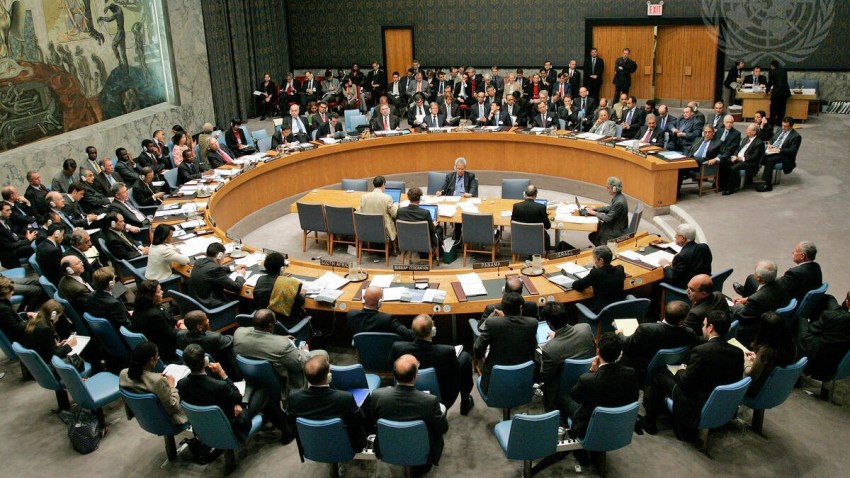The 2003 Iraq war split the Security Council, but the United Nations ultimately sustained only limited long-term damage from the incident. In the 11 years since the fall of Saddam Hussein, the council has passed over 600 resolutions on issues ranging from Iran’s nuclear program to African conflicts. Now the U.N. faces another war in Iraq, at a time when its overall credibility may be in greater danger than it was in 2003.
The Security Council has played an exceedingly minor role during the past month’s crisis in Iraq. After the forces of the Islamic State of Iraq and Syria (ISIS) seized Mosul and advanced on Baghdad in early June, the council’s members
issued a joint press statement that “deplored” the turn of events and “expressed grave concern” for those affected by the fighting. This may earn a special mention in the history of banal U.N. diplomatic declarations, but it has unsurprisingly had no impact on Iraq.
This is in stark contrast to the U.N.’s intensive dealings with Baghdad starting with the Iran-Iraq war in the 1980s and the 1990 invasion of Kuwait to the 2003 conflict. Debates on how to handle Baghdad were once,
as David Malone has argued, “a staple item of the Security Council agenda,” even overshadowing the Balkan wars. The council authorized a huge range of efforts to deal with Saddam Hussein, ranging from Operation Desert Storm in 1991 to no-fly zones, weapons inspections and sanctions.
After the initial success of Desert Storm in liberating Kuwait, these diplomatic initiatives were costly in terms of big-power relations, human lives and the U.N.’s own reputation. U.S. and British attempts to maintain pressure on Saddam in the 1990s alienated France, Russia and China. It has been claimed that international sanctions
claimed the lives of 500,000 Iraqi children. The U.N.’s “oil for food” program, meant to ease this pain, was dogged by waste and corruption. Revelations of its flaws nearly forced Secretary-General Kofi Annan to resign.
For all these failings, the U.N.’s role in Iraq kept the Security Council and the organization as a whole at the center of international affairs. The invasion of Iraq in 2003 arguably affirmed the U.N.’s significance, as Britain and other supporters of military action pressed for a Security Council endorsement for action. While crucial figures in the Bush administration, most notably Vice President Dick Cheney, were opposed to such multilateral shilly-shallying, they could not ignore the U.N. entirely.
In the current crisis, the Security Council faces a subtler but arguably even more pernicious threat: widely perceived irrelevance.
No major participant in the fight against ISIS, also known as the Islamic State of Iraq and the Levant (ISIL), appears to believe the U.N. can or should play a major role in resolving the crisis. In addition to thanking the Syrian government for air strikes against ISIS, the embattled Iraqi government has turned to the Kurds, Iran and the U.S. for military support, and to Russia for extra aircraft.
While this posse of unlikely partners may manage to halt or reverse the Islamist advance, they neither need nor want the Security Council to offer them a formal blessing. In purely legal terms, Baghdad can call on whomever it likes to help defend its sovereignty and does not need a multilateral mandate for self-defense. In political terms, trying to marshal Iraq’s allies in a single U.N.-backed framework would be counterproductive, given the obvious tensions in their political agendas.
Yet the Security Council’s marginal role in the current crisis points to broader weaknesses in the U.N.’s position in Iraq, as well as the wider Middle East and globally.
The organization has never recovered its pre-2003 influence inside Iraq. Although Annan and his advisers tried to re-establish a role for the organization after the fall of Saddam,
the murder of their envoy Sergio Vieira de Mello in Baghdad in August 2003 left this effort stillborn. The current U.N. envoy, former Bulgarian Foreign Minister Nikolay Mladenov, is well-respected. Like a number of other Eastern European politicians
I discussed in this column last week, he is a serious candidate to be the next secretary-general. But his direct political influence in Baghdad is limited.
The U.N.’s wider influence in the Middle East has, meanwhile, been undermined by the Security Council’s repeated failures to agree on how to deal with Syria. These splits have directly contributed to the present crisis in Iraq, as ISIS has used eastern Syria as the jumping-off point for its drive on Baghdad. While China and Russia have been the main obstacles to consensus, the U.S.
has also been accused of trying to keep U.N. discussions of Syria and Iraq apart, making a strategic response harder.
Finally, conflicts elsewhere have reduced the Security Council’s ability to focus on Iraq. In 2003, the Bush administration’s opponents sought to block the Iraq war in the Security Council because they had few alternative mechanisms to obstruct U.S. policy. By contrast, Russia has entirely ignored American and European attacks on its behavior in Ukraine at the U.N. this year, while China ensures that the Security Council does not address its push for control of the East and South China Seas at all.
With these tensions pushing the big powers apart—and with France and Britain, so prominent in the 2003 Iraq debates, increasingly insignificant actors—there is little chance of the Security Council settling on a meaningful strategy for handling Iraq. It is easier for the U.S. and other powers to muddle through. Having once been too deeply involved in Iraq for its own good, the Security Council has now been sidelined. Its marginalization is symptomatic of the U.N.’s deeper loss of status in world affairs.
Richard Gowan is research director at New York University’s Center on International Cooperation and a senior policy fellow at the European Council on Foreign Relations. His weekly column for World Politics Review, Diplomatic Fallout, appears every Monday.

